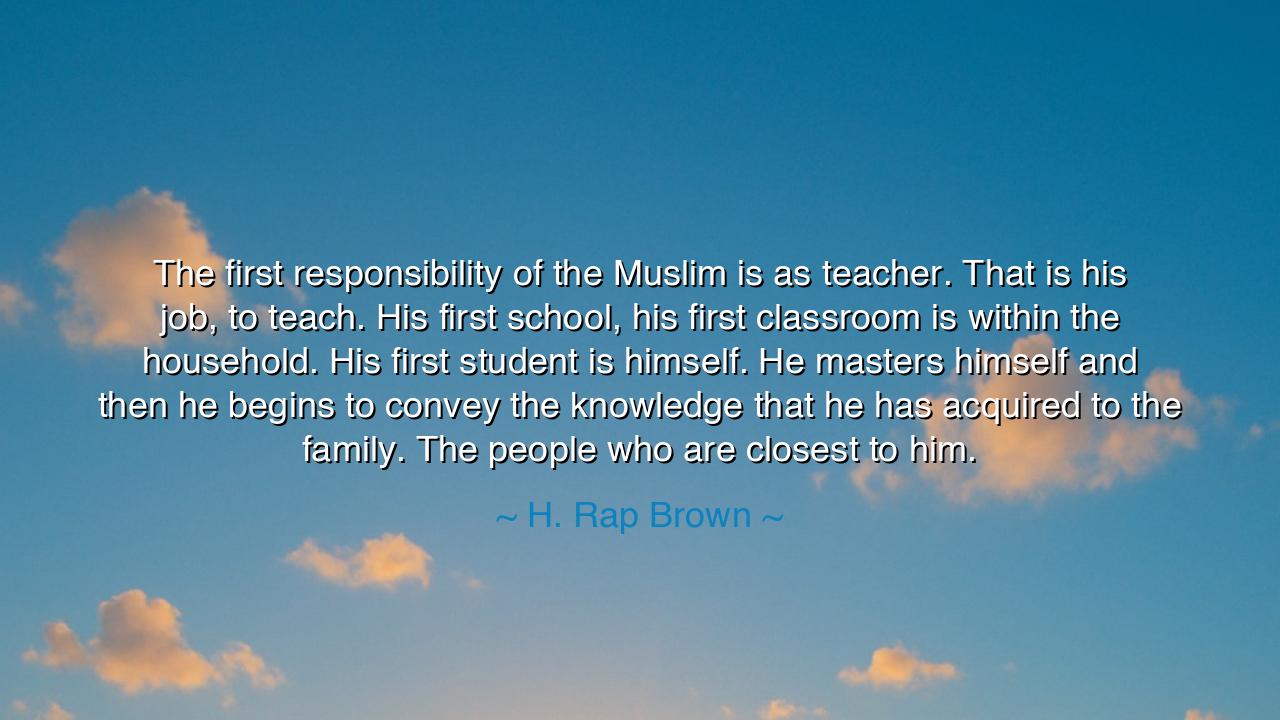
The first responsibility of the Muslim is as teacher. That is
The first responsibility of the Muslim is as teacher. That is his job, to teach. His first school, his first classroom is within the household. His first student is himself. He masters himself and then he begins to convey the knowledge that he has acquired to the family. The people who are closest to him.






H. Rap Brown once declared: “The first responsibility of the Muslim is as teacher. That is his job, to teach. His first school, his first classroom is within the household. His first student is himself. He masters himself and then he begins to convey the knowledge that he has acquired to the family. The people who are closest to him.” These words, though addressed to the faithful of Islam, ring with a universal truth that transcends creed or nation. They speak of the sacred duty of teaching, not as a profession alone, but as a way of life—beginning with the mastery of the self, and extending outward like ripples in a still pond.
The origin of this wisdom lies in the traditions of Islam itself, which honors knowledge as a form of worship and teaching as a noble duty. The Prophet Muhammad is reported to have said that seeking knowledge is obligatory upon every Muslim, and that the best among the faithful are those who learn and then teach. Brown, drawing from this foundation, reminds us that before we can hope to guide others, we must first become our own teachers. The tongue cannot speak truth if the heart has not been disciplined; the hand cannot guide if the spirit is still unsteady.
The ancients, across cultures, knew this same truth. Confucius taught that self-cultivation is the root of good governance, and that harmony in the family precedes harmony in the state. Socrates, too, insisted that the examined life was the foundation of wisdom, and that no man could truly instruct another until he had wrestled with his own ignorance. So when Brown says that the first student is the self, he joins this chorus of sages: mastery of the self is the soil from which all true teaching grows.
History gives us vivid examples. Consider the life of Mahatma Gandhi. Before he could lead a nation toward independence, he first disciplined himself—embracing simplicity, truth, and nonviolence in his personal life. His classroom was his own body and soul, his first student his own spirit. Only after he had mastered himself did his family, his community, and finally his nation begin to learn from his example. Like Brown’s words, Gandhi’s life teaches that the most enduring lessons are not spoken but lived.
The meaning of this teaching is profound: the role of a teacher does not belong only to those who stand in schools, but to every soul. Every father, mother, brother, sister, and friend is a teacher. The household is the first academy, where words and deeds shape the young and where character is passed down more powerfully than textbooks. If one fails as a teacher at home, no success in public can truly redeem it. The nearest circle of life—those who share your bread and your roof—must see in you the reflection of the wisdom you claim to carry.
The lesson for us is clear: begin with yourself. Discipline your mind, purify your intentions, and strengthen your spirit. Let your words and deeds align so that your life itself becomes a lesson worth imitating. Then, extend this teaching to those closest to you: your children, your spouse, your kin. If you nurture wisdom in your family, it will spread like fire carried from hearth to hearth, and its warmth will touch the larger community. Do not wait for stages or pulpits—your home is already a sacred school.
In practice, this means examining your daily actions. What lessons do your children or companions learn from you—not by what you say, but by what you do? Do they learn patience, humility, kindness, discipline? Or do they learn anger, weakness, and inconsistency? Take time each day to teach yourself first—through study, reflection, prayer, or discipline. Then, share what you have learned in deeds of love and guidance. In this way, your life becomes both a mirror and a torch, reflecting wisdom and igniting it in others.
Therefore, remember H. Rap Brown’s wisdom: “The first responsibility of the Muslim is as teacher.” But let it be known—this is the responsibility of every human soul. For to teach is to live in such a way that your existence itself becomes instruction. Master yourself, guide your household, and then step forth into the world. In doing so, you fulfill not only your duty to your faith or your family, but to humanity itself.






AAdministratorAdministrator
Welcome, honored guests. Please leave a comment, we will respond soon